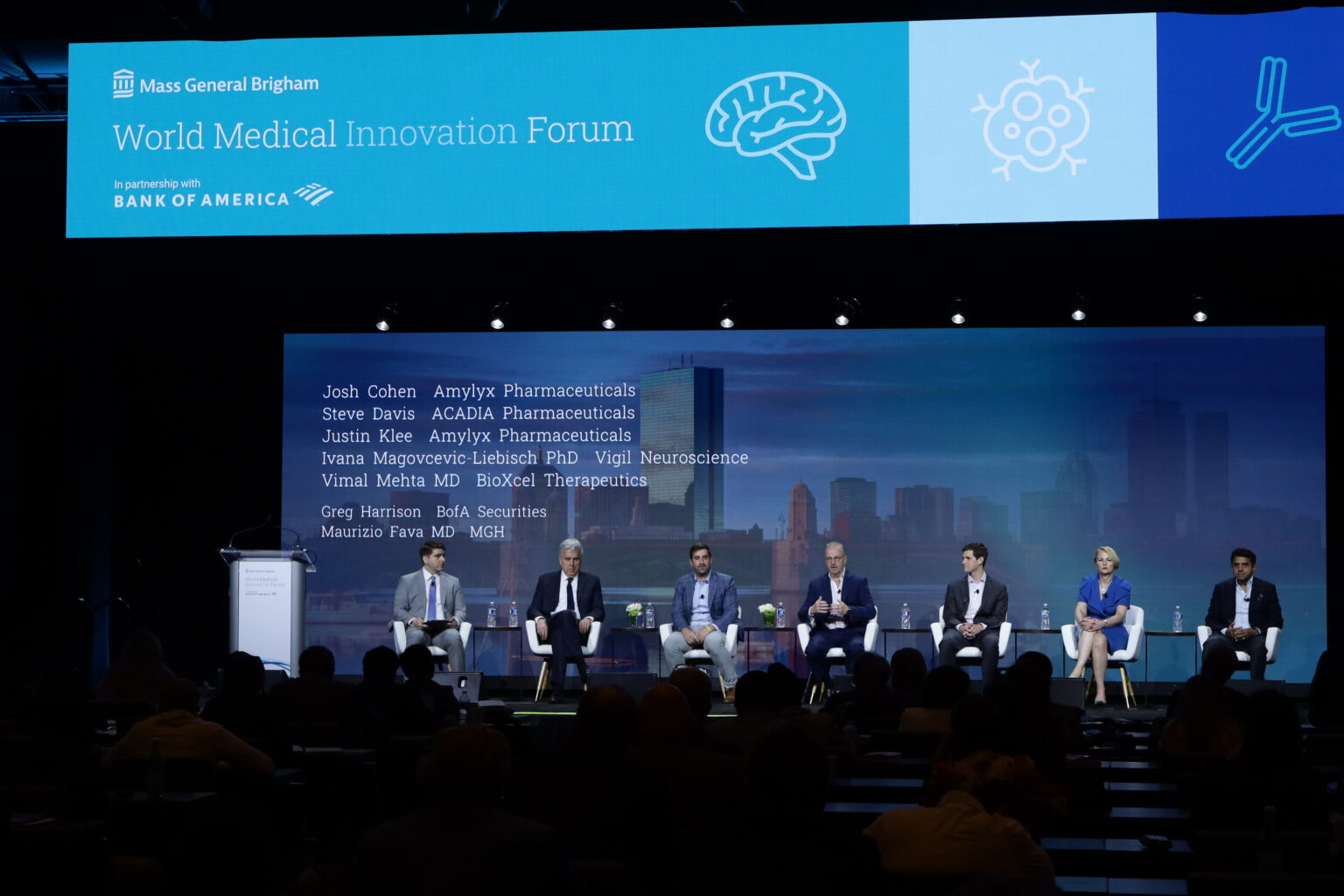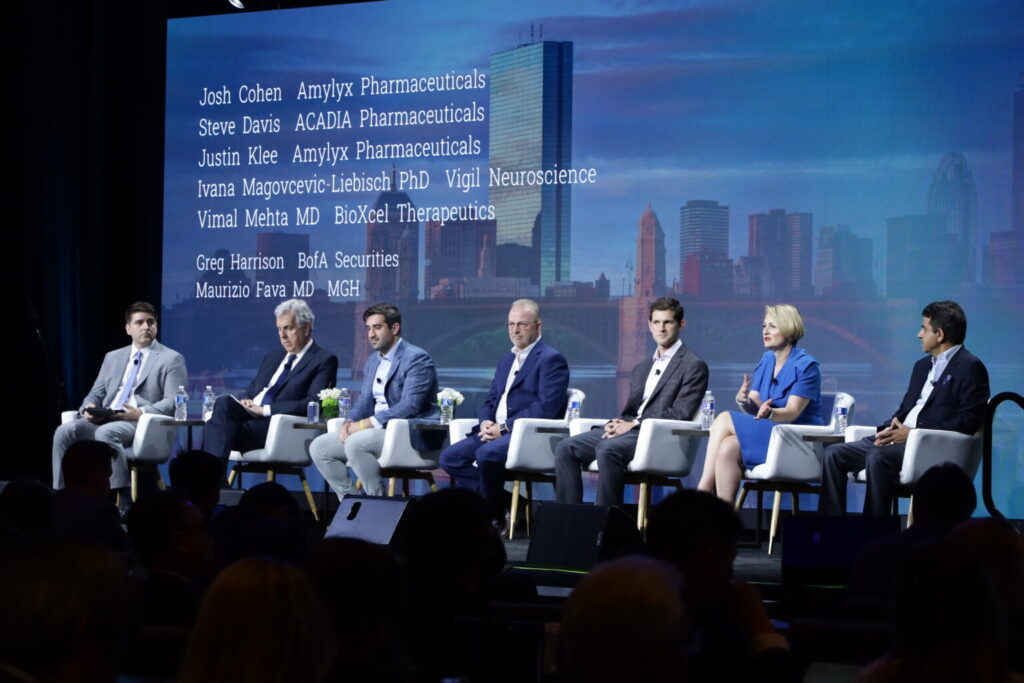WMIF MAIN SITE
2025 Event Site
Among the most challenging drugs to develop are drugs that target the brain. Yet, they signify an area of extraordinary unmet need. Advancements in comprehending the intricate biology of the human brain, coupled with the identification of reliable molecular targets for neuropsychiatric and neurodegenerative ailments, have paved the way for significant progress.
At the 2023 World Medical Innovation Forum, moderators Maurizio Fava, MD, and Greg Harrison were joined by expert panelists Joshua Cohen and Justin Klee of Amylyx Pharmaceuticals, Steve Davis, Acadia Pharmaceuticals, Ivana Magovcevic-Liebisch, PhD, Vigil Neuroscience, and Vimal Mehta, MD of BioXCel Therapeutics for a discussion on this unmet need, underscoring the importance of continued innovation in research, the need to gain a deeper understanding of the complex biology of the human brain, and validation of molecular targets for neuropsychiatric and neurodegenerative diseases, while discussing the drug development landscape for psychiatric and neurological conditions including amyotrophic lateral sclerosis (ALS), Alzheimer’s disease, schizophrenia, and depression.
In the realm of neurology and psychiatry, embarking on the journey of drug development demands a crucial decision at the start: the careful selection of an investigational agent. This initial step holds immense significance, as it paves the way for the entire development process of new drugs targeting neurological and psychiatric disorders. The panel analyzed various approaches and considerations, emphasizing a potential common theme throughout neurological diseases: broad-acting approaches and opportunities to expand to other indications to help as many people as possible.
Cohen and Klee discussed how the development of a proprietary fixed-dose therapy, hypothesized to target neuronal cell death, led them to apply their findings to ALS. Davis discussed selecting the indication for Parkinson’s Disease Psychosis based on its unique mechanism of action, which offered a favorable safety profile and avoided dopamine blocking, a crucial consideration for Parkinson’s patients. Magovcevic-Liebisch from Vigil Neuroscience adopted a precision-based approach, targeting indications associated with microglia dysfunction, selecting adult-onset leukoencephalopathy with axonal spheroids and pigmented glia (ALSP) as their first indication due to strong genetic and biochemical associations with microglia dysfunction. Lastly, Mehta of BioXCel Therapeutics focused on addressing agitation, a symptom with limited treatment options and a substantial healthcare burden.

In terms of exploring broad indications and different disease areas, Amylyx Co-CEO Cohen emphasized the unique challenges facing development in neurodegenerative diseases, such as in finding effective ways to assess the impacts that different therapies and treatments are having on people living with the diseases.
Acadia Pharmaceuticals has also pursued multiple indications simultaneously, leveraging their molecule’s safety profile to increase the likelihood of success and decided to pursue negative symptoms of schizophrenia. One panelist expanded their precision-based approach by targeting genetically defined subpopulations of Alzheimer’s disease. Another panelist utilized their artificial intelligence platform to identify a drug for agitation and successfully expanded its application into other indications, such as Alzheimer’s-related agitation and major depressive disorder, based on the data collected from thousands of patients.
When discussing the unique challenges faced by neurodegenerative disease drug development, Cohen said, “we can’t biopsy the tissue, except maybe in some peripheral neuropathies…and our endpoints in general are quite variable. Often these are cognitive tests, motor tasks that tend to be quite variable, both because of the nature of the test, but also because in many of these diseases, some patients may progress more quickly. This makes an inherent challenge that trials generally need to be large and long to have adequate statistics to detect an effect.”
Designing clinical trials for indications with long-term clinical benefits presents unique challenges in the field of neuroscience. The inability to biopsy brain tissue and the variability of endpoints due to disease progression make large and lengthy studies necessary. To address these challenges, statistical methods to reduce noise and improve precision are employed, along with the development of more reliable endpoints, such as digital biomarkers.
Natural history studies may provide insights into disease trajectories and inform trial design, and gathering insights from multiple stakeholders, including people living with the disease and their families is key to improve efficiency and accessibility. By adopting these strategies, researchers aim to increase the probability of success in clinical trials and accelerate the development of effective treatments for neurological and psychiatric diseases.
Klee added when it comes to focusing on individuals living with neurodegenerative diseases, “we often forget that the people who are the most expert in a particular disease are the people who are living it every day, and you really change many of your considerations in clinical trial design based on the input you get from people who are living with it as well as their caregivers.”
When it comes to the role of artificial intelligence (AI) in development within biotech and neurology, AI has the potential to become a valuable tool. While acknowledging the impressive capabilities of AI and emphasizing its integral role in their work, the panelists also emphasized the continued importance of human expertise in technical areas like neurology and psychiatry.
“The uses of AI are only as good as the data that we have. And the hardest thing in all of the diseases that we work in is translation. What we see in the pre-clinic doesn’t necessarily translate into the clinic. And I think the answer is we need better resources and databases from people with the disease, from biomarkers, from things that actually represent the clinic. Before we even get to AI, I think we need the right data collection and databases in order to study it,” said Klee.
Watch The Disruptors: The Next Wave of Promising Psychiatry and Neurology Drugs from the 2023 World Medical Innovation Forum.